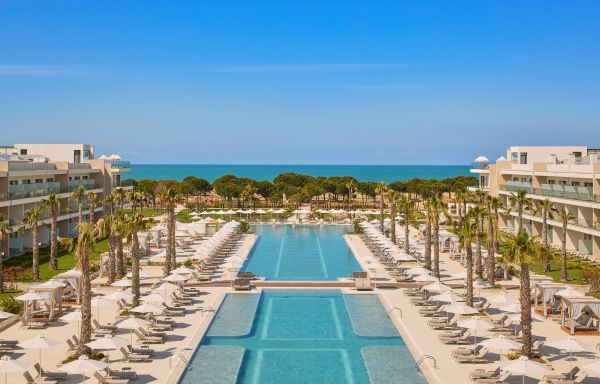Investors in hotel assets are all-in on Europe, but it’s not going to come cheap. That was just one of the nuggets of information that came out of CBRE’s 2024 European Hotel Investor Intentions Survey, which revealed increased optimism and a hunger for value-add opportunities fueling the market, despite recent geopolitical challenges, along with a change in the top spot for capital deployment.
The report indicated that more than 90% of European hotel investors plan to sustain or increase their capital investments in 2024, particularly in luxury developments.
Kenneth Hatton, head of hotels, Europe, CBRE, identified several reasons for the rosy outlook, including an environment where travel demand is still high against a compression of available rooms, a product of some four years now of stunted new-hotel construction, the result of a higher cost to build due to more expensive financing options.
“You’ve got this magic combination of increasing demand and reduced supply, which basically gives the investors the view that they’ve got pricing power. The critical piece in 2024 is that there’s far more debt available because interest rates are now stabilizing, inflation is under control and borrowers can project and predict their cost of debt,” Hatton said. “They have the confidence to go ahead and borrow and do a deal.”
He added there are also now non-traditional hotel investors that feel a bit more comfortable dabbling in the space. “Investors like the number of power levers for value creation they have: operational improvements, brand repositioning and ROI CapEx projects if they want a little more yield,” he said.

WHO’S ON TOP?
Regionally, Spain is now the top destination for hotel investment, according to the report, besting the U.K. It’s not all gloom in England: London remains the top city for investment, followed by Madrid and Paris.
In 2023, Spain was the second-most visited country in the world behind France with 85 million tourists, according to the National Statistics Institute. Some investors seek partnerships with established brands like Spain’s Meliá Hotels International, which has an extensive global portfolio of differentiated brands, while others opt for rapidly growing brands like Leonardo Hotels whose owner, the Israeli-founded Fattal Hotel Group, has acquired 40 European hotels in the last 24 months, including a fourth in Madrid slated to open in 2026.
“Spain offers a favorable investment climate,” said Gabriel Escarrer Jaume, CEO and chairman of Meliá Hotels International. “Madrid’s regional government is rolling out initiatives to boost tourism and hospitality, like improving infrastructure and international music events. Property prices in Madrid are relatively lower than other European capitals, and the returns are quite attractive. This kind of backing makes it a great environment for investors.”
His global development VP, María Zarraluqui, said that one of the larger trends for developers in Spain and across Europe is the repositioning of assets. “Not just with third-party hotels,” she said. “We also form joint ventures with the market’s biggest players to realign our own properties. Our ‘asset-right strategy’ repositions our brands to achieve higher yields and upgrades our portfolio.”

It’s simple math as to why hotel investment in Spain, Madrid specifically, has become so attractive, according to Jon Critchley, director of HVS Hodges Ward Elliott. “Madrid is double the size of Barcelona, but the number of hotel beds is half, with the lion’s share still domestically owned, and a value-add opportunity,” he said. “There’s a lot of heat buying assets in prime locations. Although slight legal points in valuation mechanics deter some international lenders, local lenders are currently very keen on hotels, which helps regenerate the regional economy. The breadth of the lender pool is as wide as it’s ever been. Spain is generally perceived as an easy country to do business in, but it’s very much limited to the big markets of Barcelona, Madrid and the Canary and Balearic Islands, where further growth is still perceived to come.”
Critchley noted the return of investors who had been waiting for more favorable conditions. And although local players have historically dominated the Spanish market, international investors—private equity firms, family offices, insurance companies, sovereign wealth funds—are now active.
RAISING THE STAKES
In its pursuit of rapid international expansion, Fattal has raised €1.5 billion across three rounds of funding from institutional investors, including insurance companies and pension funds, said Ronen Nissenbaum, CEO UK, Ireland, Benelux, Spain, Portugal and US Development, Fattal Hotel Group.
Of the company’s 300 hotels, around 250 are based in Europe, and that figure will rise. “Our strategy is to raise another fund, much larger, that will be more global and more internationally focused, with institutional investors from Europe and from the United States,” he said.
Nissenbaum said that part of the attraction for European properties is that many remain unaffiliated. Financial distress due to owners needing to refinance at higher rates has led to more properties becoming available. Fattal’s strategy is to acquire both major city and resort properties, while considering secondary and tertiary areas to diversify locations and create economies of scale within the portfolio.

It’s prudent that investors also address the geopolitical risks of overtourism. A coordinated public policy approach is essential to mitigate the impacts of mass tourism, particularly with mega hotels using disproportionate levels of natural resources. Supported by infrastructure that enables crowd management, initiatives like Majorca’s successful redistribution of tourists across the island aim to balance tourism benefits and local community impacts. Investors are increasingly partnering with local businesses to strengthen community engagement and reduce carbon footprints.
“Most key regulatory decisions will be at a municipal level rather than state, and city authorities will continue balancing the tremendous economic and social benefits of valuable tourism with the environmental, infrastructure, affordability and social cohesion issues, while also remaining mindful of the need to retain a degree of diversification in the local economy,” said Hatton.
He speculated more cities potentially imposing the kinds of limitations seen in places like Amsterdam: a moratorium on additional hotel rooms; more and more regulated lodging products; and private rentals (where still permitted) adhering to regulatory requirements that have long-bound hotels. “In the long run, one would expect the relative economic power of existing hotels to rise, when considering the barriers to entry in the relevant market. The other consequence that seems likely is the spread of tourism to destinations less busy than traditional hotspots,” Hatton said.
Developing hotels in up and-coming destinations gives investors the opportunity to identify the best locations and form strategic, high-quality partnerships. Meliá, for one, has embraced Albania on a large scale, signing its first deal in the Balkan country seven years ago. “Now, we have more than 20 hotels, five open and the rest under construction,” said Zarraluqui, noting that Albania is one of the few underdeveloped places in Europe with a unique setting and expansive beaches along the Adriatic and Mediterranean Seas.
Story contributed by Alicia Sheber.
